Displaying entries for tag: Projects
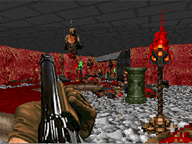 Noesis now includes a Roomba script. It will track your Roomba, store tracking data, allow you to visualize that data in a variety of ways, and, of course, turn that data into a randomized DOOM map.
Noesis now includes a Roomba script. It will track your Roomba, store tracking data, allow you to visualize that data in a variety of ways, and, of course, turn that data into a randomized DOOM map.
It would've been nice to get this done in time for DOOM's 25th anniversary, but as it came and went, I was still waiting to grab a Roomba 980 on eBay. I had the idea sometime back in November, as my wife and I were researching robot vacuums. I discovered that the newer Roombas are making use of a pretty respectable SLAM implementation, which led to wondering about what kind of data I could get out of it and what I could do with that data. Read more...
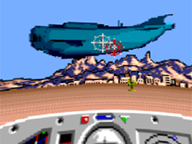 Equipped with a high-frequency inertial measurement unit and two LCD screens, the Sega VR headset shares a lot of fundamental design with today's VR headsets. That design was nothing short of revolutionary when Sega officially unveiled the unit in 1993, promising to break new ground on the frontier of virtual reality.
Equipped with a high-frequency inertial measurement unit and two LCD screens, the Sega VR headset shares a lot of fundamental design with today's VR headsets. That design was nothing short of revolutionary when Sega officially unveiled the unit in 1993, promising to break new ground on the frontier of virtual reality.
Up to this point, we've gathered most of what we know about Sega VR from trade show appearances, marketing materials, patent documents, and firsthand accounts. This has meant that many of the unit's technical details have remained speculative or completely unknown. When looking back and studying hardware that pushed so many of the technical boundaries of its time, however, those details are important! Whether Sega VR achieved its many ambitious goals or not, it remains a fascinating and notable entry in VR history. Read more...
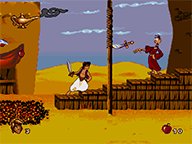 When it was released back in 1993, Disney's Aladdin for the Sega Genesis (or Mega Drive, depending on which side of the pond you lived on through the early 90's) was really a visually striking game.
When it was released back in 1993, Disney's Aladdin for the Sega Genesis (or Mega Drive, depending on which side of the pond you lived on through the early 90's) was really a visually striking game.
Powered by what eventually became known as "Digicel" technology, along with a solid selection of middleware and some impressive talent, Aladdin managed to set itself apart from other Genesis titles of the era. Aladdin's beautifully hand-crafted, surprisingly well-quantized artwork set new expectations for many in the realm of what could be accomplished on Genesis hardware. Read more...
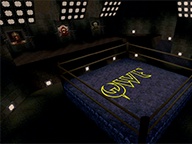 Quake for the Sega Saturn is an interesting port. Actually, rather than really being a port at all, it's Quake completely reconstructed in the SlaveDriver engine, which is the engine also used by Lobotomy Software's console ports of PowerSlave and Duke Nukem 3D.
Quake for the Sega Saturn is an interesting port. Actually, rather than really being a port at all, it's Quake completely reconstructed in the SlaveDriver engine, which is the engine also used by Lobotomy Software's console ports of PowerSlave and Duke Nukem 3D.
A few people have expressed interest in being able to recover and/or port the levels from this version of the game, so it's been sitting around on my list of games to take a look at for quite a few years now. I finally got around to taking a look at the LEV files a few weekends ago on a whim, and after a couple more weekends of chipping away at it, it's at a point where it's ready to be included in a Noesis release.
Support in Noesis is nice on its own and can facilitate porting the maps over to other engines (with a good bit of manual effort), but I also want to share all of my findings so far, mostly for the sake of posterity. Read more...
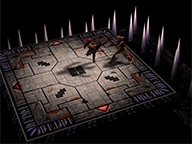 A few days ago, I decided to reverse engineer FX Fighter. Being a poor boy, I missed out on most of the Saturn gaming era, and FX Fighter running on my old 486 was my first actual experience with a 3D fighter outside of the arcade. So it'd been sitting on my list of games to reverse for nostalgia's sake, and I figured I'd tackle it one day, hopefully using a nice IDA Pro plugin for DOSBox integration that handled DOS4GW applications. (there is a plugin, but I've had no luck getting it to debug 32-bit DOS apps) But the urge just struck me last weekend, and I decided to go after it armed with nothing but IDA Pro and an old build of DOSBox with its debugger enabled. Now I'm going to write a whole article about the process!
A few days ago, I decided to reverse engineer FX Fighter. Being a poor boy, I missed out on most of the Saturn gaming era, and FX Fighter running on my old 486 was my first actual experience with a 3D fighter outside of the arcade. So it'd been sitting on my list of games to reverse for nostalgia's sake, and I figured I'd tackle it one day, hopefully using a nice IDA Pro plugin for DOSBox integration that handled DOS4GW applications. (there is a plugin, but I've had no luck getting it to debug 32-bit DOS apps) But the urge just struck me last weekend, and I decided to go after it armed with nothing but IDA Pro and an old build of DOSBox with its debugger enabled. Now I'm going to write a whole article about the process!
This isn't so much intended to be a file spec, as it is just a direct chronicle of my experiences and findings in figuring the game's formats out, in the actual order of my work/discovery. It's like you're right there scoping through the binary with me! I'll describe all of my approaches and general methodology here, as well, so get ready to digest a lot. Read more...
 Noesis now comes equipped with a Model Server script. You point it at a directory, and it crawls through everything under that directory to generate a cache of converted models. You can then tell it to spin up a web server, which hosts an index of said models, along with the models themselves via an embedded WebGL viewer.
Noesis now comes equipped with a Model Server script. You point it at a directory, and it crawls through everything under that directory to generate a cache of converted models. You can then tell it to spin up a web server, which hosts an index of said models, along with the models themselves via an embedded WebGL viewer.
As part of this functionality, I added support for importing and exporting glTF files. The importer handles both version 1.0 and 2.0 files. I also took the liberty of implementing a Noesis-specifc extension in order to preserve some of the more common data that the latest specification still doesn't cover. Read more...
Pages:
[1] 2 3 ... Next
Tags: Projects, Technology
DOOMBA
December 24, 2018 at 9:37 am (CST)
34 comments
 Noesis now includes a Roomba script. It will track your Roomba, store tracking data, allow you to visualize that data in a variety of ways, and, of course, turn that data into a randomized DOOM map.
Noesis now includes a Roomba script. It will track your Roomba, store tracking data, allow you to visualize that data in a variety of ways, and, of course, turn that data into a randomized DOOM map.It would've been nice to get this done in time for DOOM's 25th anniversary, but as it came and went, I was still waiting to grab a Roomba 980 on eBay. I had the idea sometime back in November, as my wife and I were researching robot vacuums. I discovered that the newer Roombas are making use of a pretty respectable SLAM implementation, which led to wondering about what kind of data I could get out of it and what I could do with that data. Read more...
Tags: Projects, Technology
Sega VR Emulation
January 7, 2021 at 6:17 pm (CST)
 Equipped with a high-frequency inertial measurement unit and two LCD screens, the Sega VR headset shares a lot of fundamental design with today's VR headsets. That design was nothing short of revolutionary when Sega officially unveiled the unit in 1993, promising to break new ground on the frontier of virtual reality.
Equipped with a high-frequency inertial measurement unit and two LCD screens, the Sega VR headset shares a lot of fundamental design with today's VR headsets. That design was nothing short of revolutionary when Sega officially unveiled the unit in 1993, promising to break new ground on the frontier of virtual reality.Up to this point, we've gathered most of what we know about Sega VR from trade show appearances, marketing materials, patent documents, and firsthand accounts. This has meant that many of the unit's technical details have remained speculative or completely unknown. When looking back and studying hardware that pushed so many of the technical boundaries of its time, however, those details are important! Whether Sega VR achieved its many ambitious goals or not, it remains a fascinating and notable entry in VR history. Read more...
An Old New World
October 11, 2017 at 2:30 pm (CST)
 When it was released back in 1993, Disney's Aladdin for the Sega Genesis (or Mega Drive, depending on which side of the pond you lived on through the early 90's) was really a visually striking game.
When it was released back in 1993, Disney's Aladdin for the Sega Genesis (or Mega Drive, depending on which side of the pond you lived on through the early 90's) was really a visually striking game.Powered by what eventually became known as "Digicel" technology, along with a solid selection of middleware and some impressive talent, Aladdin managed to set itself apart from other Genesis titles of the era. Aladdin's beautifully hand-crafted, surprisingly well-quantized artwork set new expectations for many in the realm of what could be accomplished on Genesis hardware. Read more...
Saturn Quake
May 3, 2015 at 2:35 pm (CST)
 Quake for the Sega Saturn is an interesting port. Actually, rather than really being a port at all, it's Quake completely reconstructed in the SlaveDriver engine, which is the engine also used by Lobotomy Software's console ports of PowerSlave and Duke Nukem 3D.
Quake for the Sega Saturn is an interesting port. Actually, rather than really being a port at all, it's Quake completely reconstructed in the SlaveDriver engine, which is the engine also used by Lobotomy Software's console ports of PowerSlave and Duke Nukem 3D.A few people have expressed interest in being able to recover and/or port the levels from this version of the game, so it's been sitting around on my list of games to take a look at for quite a few years now. I finally got around to taking a look at the LEV files a few weekends ago on a whim, and after a couple more weekends of chipping away at it, it's at a point where it's ready to be included in a Noesis release.
Support in Noesis is nice on its own and can facilitate porting the maps over to other engines (with a good bit of manual effort), but I also want to share all of my findings so far, mostly for the sake of posterity. Read more...
FX Fighter
April 20, 2011 at 5:49 am (CST)
 A few days ago, I decided to reverse engineer FX Fighter. Being a poor boy, I missed out on most of the Saturn gaming era, and FX Fighter running on my old 486 was my first actual experience with a 3D fighter outside of the arcade. So it'd been sitting on my list of games to reverse for nostalgia's sake, and I figured I'd tackle it one day, hopefully using a nice IDA Pro plugin for DOSBox integration that handled DOS4GW applications. (there is a plugin, but I've had no luck getting it to debug 32-bit DOS apps) But the urge just struck me last weekend, and I decided to go after it armed with nothing but IDA Pro and an old build of DOSBox with its debugger enabled. Now I'm going to write a whole article about the process!
A few days ago, I decided to reverse engineer FX Fighter. Being a poor boy, I missed out on most of the Saturn gaming era, and FX Fighter running on my old 486 was my first actual experience with a 3D fighter outside of the arcade. So it'd been sitting on my list of games to reverse for nostalgia's sake, and I figured I'd tackle it one day, hopefully using a nice IDA Pro plugin for DOSBox integration that handled DOS4GW applications. (there is a plugin, but I've had no luck getting it to debug 32-bit DOS apps) But the urge just struck me last weekend, and I decided to go after it armed with nothing but IDA Pro and an old build of DOSBox with its debugger enabled. Now I'm going to write a whole article about the process!This isn't so much intended to be a file spec, as it is just a direct chronicle of my experiences and findings in figuring the game's formats out, in the actual order of my work/discovery. It's like you're right there scoping through the binary with me! I'll describe all of my approaches and general methodology here, as well, so get ready to digest a lot. Read more...
Tags: Projects, Technology
Noesis Model Server
January 27, 2019 at 12:23 am (CST)
 Noesis now comes equipped with a Model Server script. You point it at a directory, and it crawls through everything under that directory to generate a cache of converted models. You can then tell it to spin up a web server, which hosts an index of said models, along with the models themselves via an embedded WebGL viewer.
Noesis now comes equipped with a Model Server script. You point it at a directory, and it crawls through everything under that directory to generate a cache of converted models. You can then tell it to spin up a web server, which hosts an index of said models, along with the models themselves via an embedded WebGL viewer.As part of this functionality, I added support for importing and exporting glTF files. The importer handles both version 1.0 and 2.0 files. I also took the liberty of implementing a Noesis-specifc extension in order to preserve some of the more common data that the latest specification still doesn't cover. Read more...
[1] 2 3 ... Next
Stream Tags
Projects
Everything
Personal
Analysis
Indie
Technology
AVALANCHE
R-Cube Engine
Modding
Game Design
Commercial
iPhone
Rapture
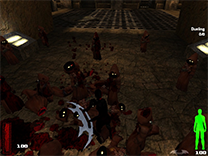
Recent Comments
13716121 page hits since February 11, 2009.
Site design and contents (c) 2009 Rich Whitehouse. Except those contents which happen to be images or screenshots containing shit that is (c) someone/something else entirely. That shit isn't really mine. Fair use though! FAIR USE!
All works on this web site are the result of my own personal efforts, and are not in any way supported by any given company. You alone are responsible for any damages which you may incur as a result of this web site or files related to this web site.
